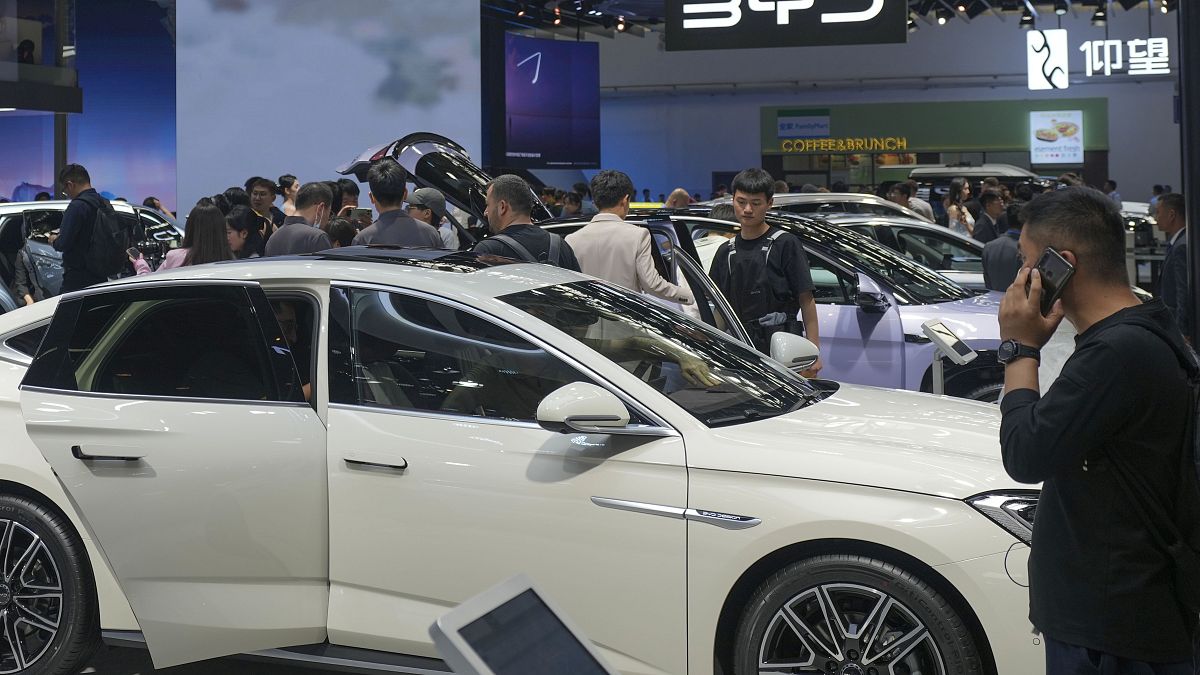The EU is walking a delicate tightrope, with some member states keen to protect their markets, while others want to safeguard Chinese investment and to attract more.
EU leaders described China as a partner, competitor and systemic rival in summit conclusions last summer. The ambiguity of that description was also reflected in last Friday’s European Commission decision to impose hefty tariffs of up to 35.3% on Chinese-made EVs, with the EU executive stepping in to overcome ambivalence and opposition from member states.
This reflects the delicate tightrope the EU is currently walking as it balances the instinct of some member states to protect its trade from subsidised and effective Chinese markets, against that of others keener to safeguard existing Chinese foreign direct investment and to attract more.
In the Trade Defence Instruments Committee – the group gathering experts from the Member states where the vote on the Commission’s proposal took place – Germany, backed by Hungary, Malta, Slovenia and Slovakia, all sought to prevent the tariff imposition.
The remaining countries were broadly divided with 12 abstentions: Austria, Belgium, Croatia, the Czech Republic, Cyprus, Finland, Greece, Luxembourg, Portugal, Romania, Spain, Sweden. Meanwhile ten countries voted in favour of the Commission’s proposal – Bulgaria, Denmark, Estonia, France, Ireland, Italy, Latvia, Lithuania the Netherlands and Poland.
Invest rather than sell?
According to Victor Crochet, a lawyer with Van Bael & Bellis, “the idea behind the Commission’s decision is that the Chinese instead of exporting their products to Europe will invest in Europe.” But governments appear wary that the two might be mutually exclusive and concerned that fending off cheaper Chinese imports might impact entrenched investment into the bloc by Asia’s rising giant.
According to Commission data, Chinese foreign direct investment to the EU amounted to €4.7 billion in 2023, a decrease of 10% compared with 2022. The top sectors targeted by China were automotive, biotechnology, health and pharmaceuticals.
Certainly the pattern of voting reflects the variety of differing relations and attitudes towards China economic relations within the EU member states.
Unusually, for a significant trade measure, the action was taken in the face of opposition from Europe’s manufacturing powerhouse and leading economy, Germany. Since the Commission first launched its investigation into the China EV sector, Berlin has been a lonely player, keen to defend its access to the Chinese market for its industries, not least its auto industry, to supply the Chinese market.
This access has become more pivotal for Germany against the headwinds of difficult market conditions, as demand has slowed in China as a result of a dipping economy, and also on the European market for EVs produced by its car manufacturers in China.
“Germany defends vested interests of its car companies, such as Volkswagen,” said Alicia Garcia Herrero, analyst at the Bruegel think tank in Brussels, in the wake of Friday’s vote. “While Volkswagen is laying off people in Europe, because it no longer exports from Europe, Germany voted against the EU tariffs, [its decision] favouring German cars produced on the Chinese market, by Chinese workers.”
Some member states are eager to accept Chinese largesse, such as Hungary, which voted against the tariffs and has become a destination of choice for China, since the decision of giant EV manufacturer BYD to open a factory there in December last year.
Spain, whose Prime Minister Pedro Sanchez, visited China on a charm offensive at the beginning of September, abstained. In April, China’s Chery Auto signed a deal with EV Motors to produce cars in Spain. Chinese EV auto company Nio has been showing some interest in Audi’s loss-making Brussels-based factory in Belgium, another country which abstained.
Other member states, such as France and Italy, have both been more full-throated in support of tariffs. Both have powerful automotive sectors, which sell less in China, and are keen to defend their domestic markets.
The EV tariffs imposed by the EU remain lower than their equivalents in Brazil, Canada, India, Turkey and the US, according to Garcia Herrero. “55% of Chinese EVs go to Europe, where else could they go?” she asked. “The tariffs could be higher; we are not at war with China,” added one EU diplomat.
Protecting one’s own interests
The move to impose tariffs also shows the EU moving away from a clear ideological open market position. It also cements the implementation of a more protectionist agenda in respect to China that began when it adopted in 2019 a Foreign Subsidies Regulation which came into force in 2023.
This gives the EU power to screen and defend against inward investment by non-European state-subsidised companies. “In Chinese eyes, it is an anti-China defensive tool,” according to Crochet.
The Chinese have already begun retaliation, appealing to the World Trade Organization over the EU’s imposition of provisional tariffs.
It has also threatened to impose tariffs on cognac, the luxurious French brandy, as well as on pork and European dairy products. However those threats, particularly in the case of France, appeared to miss their mark.
“For France and Italy, their automotive industry comes first. On the French side, It’s consistent with their economic policy of the last years which aims at putting more emphasis on industries rather than into agriculture and the luxury sector,” Crochet added.
The tariff imposition sent off a clear, unified message from the EU, but the underlying patchwork of opinion within member states suggests that the trade relationship will remain ambiguous and piecemeal.

